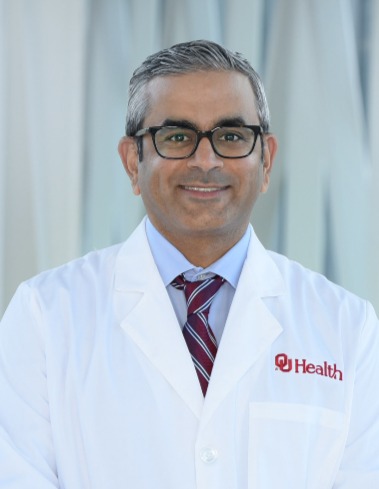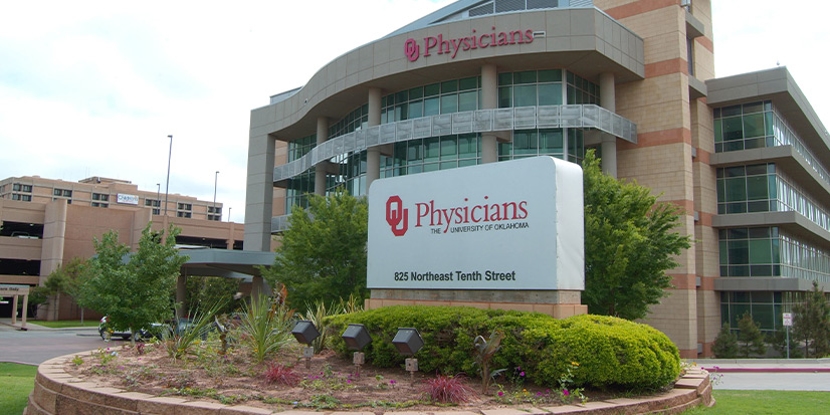Request an appointment, get a second opinion, or ask your doctor for a referral to electrophysiology specialists at OU Health.
Oklahoma City(405) 271-7001
Dizziness, shortness of breath, fainting or the feeling of your heart racing or pounding in your chest may indicate that your heart’s electrical system needs attention.
Choose the cardiologists with specialty training in electrophysiology (EP) at OU Health in Oklahoma City for the expert care you need to diagnose and treat heart rhythm concerns, including arrhythmias and related conditions. You work together with a multidisciplinary team of electrophysiologists, cardiologists, interventional cardiologists and other healthcare professionals to evaluate unusual issues with the electrical system that keeps your heart beating regularly. You and your heart care team also develop an individualized treatment plan designed to address your specific situation.
Request an appointment, get a second opinion, or ask your doctor for a referral to electrophysiology specialists at OU Health.
Oklahoma CityAs part of your personalized comprehensive treatment plan, you and your OU Health heart care team may take advantage of multiple sophisticated onsite cardiac catheterization and electrophysiology labs. In these special OU Health facilities, you may participate in a wide range of noninvasive and minimally invasive diagnostic tests and procedures that support an accurate diagnosis and help determine appropriate treatments for a variety of conditions affecting your heart rhythm.
At OU Health, you benefit from the extensive experience of groundbreaking OU Health electrophysiologists, including Dr. Warren Jackman, who invented catheter-based ablation for many types of arrhythmias, and Dr. Dwight W. Reynolds, who pioneered minimally invasive pacemaker implantation procedures introduced here at OU Health.
These cardiology/EP experts continue to teach upcoming generations of OU Health electrophysiologists—as they and their colleagues also help you and your friends, neighbors, and others from across the nation by performing hundreds of pacemaker placements, defibrillator (ICD) implantations, catheter ablations, minimally invasive revisions to previous procedures and pacing device lead extractions each year.
No matter where you live in Oklahoma or across the region, you also benefit from OU Health as a regional referral center for electrophysiology (EP) procedures, including complex lead extractions.
Arrhythmias, the most common indicator of a problem with the heart’s electrical system and its ability to maintain a steady heartbeat, appear in many forms and may involve symptoms such as:
Chest pain or pressure may indicate either arrhythmia or heart attack. If you feel like you’re having a heart attack, call 911 immediately.
Problems involving the electrical system in your heart encompass a wide range of conditions, including:
For SVT, PVC and many other arrhythmias, EP ablation procedures often achieve a 95 percent success rate, meaning the problem disappears and doesn’t return. For atrial fibrillation (Afib), catheter-based ablation can prevent further heart-rhythm events and improve your symptoms and quality of life.
Heart Attack Symptoms - Get to know the American Heart Association’s warning signs of heart attack. For immediate help, call 911.
To better understand and monitor your current heart rate, electrical function, risk and related conditions, you and your OU Health heart care team may recommend your participation in an electrophysiology (EP) study or other diagnostic options such as:
Trust the electrophysiologists on your OU Health heart care team to provide extensive counseling about your condition, procedures, treatment options and next steps as you work together to develop an accurate diagnosis. Your personal heart care treatment plan may involve one or more electrophysiology procedures and services, including:
Your team also helps keep you safe during procedures with high-resolution images and comprehensive information from advanced precision guidance technologies including:
When you choose OU Health for EP services, you work with the expert cardiologists who deliver top-quality care as they also train the next generation of electrophysiology professionals. The exceptional care you count on from your OU Health electrophysiologists stems, in part, from serving as the region’s only EP fellowship-based training site. During your care and treatment at OU Health, you also may gain early access to innovative EP devices and procedures developed through your team’s participation in a variety of research studies and clinical trials.
At OU Health, you or your loved ones work with a multidisciplinary team of extensively educated electrophysiologists, cardiologists, cardiac surgeons and diverse physicians in related healthcare specialties, including world leaders who invented EP-performed catheter ablation for many types of arrhythmias and pioneered minimally invasive procedures for pacemaker/defibrillator implantation and revision. You can count on receiving top-quality, long-term, compassionate care from your professionally trained EP specialists, support staff and other heart care team members, as you also benefit from original research and advanced technologies.









































Think heart disease only affects older adults? Think again. More adults under 40 are experiencing heart problems than ever before, and the trend is ...
Heart failure, also known as congestive heart failure (CHF), is a long-term, worsening condition in which the heart muscle can't pump sufficient blood ...